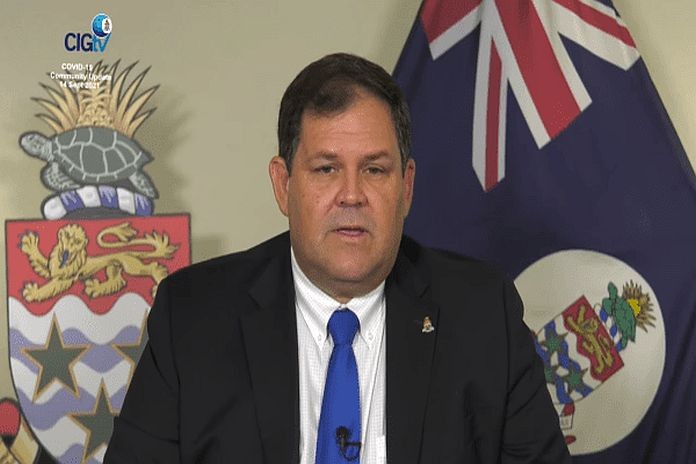GEORGE TOWN, Cayman Islands (CNS) – Civil service bosses have been told to cut spending by around $47 million before the end of the year. With just four months left of 2023, premier Wayne Panton, wearing his finance minister hat, has called on public servants to save cash as operational expenditure climbs toward $1 billion. He told CNS this wasn’t a reaction to a crisis but a proactive move towards an achievable 8.5 percent budget cut.
Panton said he circulated an internal memo earlier this month asking government employees to help rein in spending by around $47.1 million for the rest of this year. “What I want is to proactively manage spending rather than leaving things to chance,” he said Tuesday, following reports the memo to chief officers and others in government had been circulated.
“We are not in a crisis or in any real danger of breaching the Framework for Fiscal Responsibility. But spending is increasing and we don’t want to just hope that everyone will spend wisely but to remind them that this is public cash,” he added.
Panton said the request for everyone to pay closer attention and look for cuts was about prudent fiscal management and achieving financial targets that will ensure compliance with the principles of fiscal responsibility.
“This is exactly what a finance minister should be doing,” he said. Since Cayman does not have a centralised overview of public spending, it is important for each chief officer and their chief financial officers to keep a close eye on the level of spending within their ministries, he added.
If spending remains as the first six months of this year, operating expenditure will exceed CI$1 billion for 2023, the premier warned, and with even more growth in expenditure expected next year, it was time for tighter spending controls.
The budget for 2024 and 2025 is expected to be presented to parliament later this year, and Panton is keen to get the message out that the pace of public spending must be reduced now and next year.
He still expects revenue to be higher this year than in 2022, but he said it is important that the government maintains a healthy surplus and cash reserves so it has the money to support social programmes and to steer the country through whatever lies ahead, from pandemics to storms
A recently released cabinet meeting summary revealed that $3 million had been transferred from the government school meals programme. However, Panton confirmed that there would be no reductions to this initiative when children return to the classroom next month and this important and successful programme was not under threat. He explained that the original budget allocation was far more than what was actually being spent and the money was needed elsewhere.
He said that “hard decisions will have to be made”, and everyone in government had an obligation to make sure spending targets are not overshot, but seeking cuts would help ensure that the budget remains on track.
Panton acknowledged that the government does not have a great track record at forecasting and often overestimates what is needed, but once the money is budgeted, people will spend it. He said there was room in the budget to make cuts without impacting services and start working towards more realistic budget forecasting with a tightening-up exercise.
Responding to the budget cuts, former finance minister Chris Saunders (BTW) said the premier should have addressed the spending issue earlier in the year because the clock was now running out. Speaking to CNS on Tuesday, he said he sent an email to Panton around 12 January, “copied to all members of the PACT Government, regarding the expenditure targets for the 2023 financial year. It took him more than a month to respond to my email.”
Saunders was ousted from office in March and has since been raising the alarm from the opposition benches about government spending and unsustainable revenue. During the debate on the strategic policy statement in April, he argued that the forecast financial performance of the government was problematic because of high public spending and because of where the money was coming from.
He told CNS said that in addition to the extra revenue from tourism this year, 33 percent of the positive results for the budget at the halfway stage this year was from work permits. “In short, tourism and work permits accounted for 80% of the positive variance to budget,” Saunders said, as he questioned what would happen if the US went into a recession. “How long can we keep depending on work permit revenues?”
He said the current revenue model is unsustainable and expenses are out of control. “There’s a culture that needs to change within the government,” Saunders told CNS. “One of the first things I did as minister of finance was implement a policy where any variable expenses over $5,000 needed to be approved by the relevant minister.”
While this irked some people across government, Saunders believes the situation is serious and has to be addressed. The strategic policy statement had predicted that spending would not reach the one billion mark until 2026. “Sadly, they are now three years ahead of schedule,” he said.
This article originally appeared on CNS on August 23, 2023.





